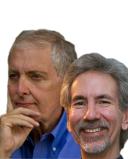Fear
Memorably Wise Speeches
The current campaign rhetoric is no match for famous speeches from our past.
Posted December 16, 2015
History is unlikely to look kindly on the rhetoric offered thus far by those seeking to

become the 45th President of the United States. Donald Trump’s harsh, divisive language has embarrassed his own party and convinced members of the Armed Forces that he is aiding the cause of Islamic extremism. Only 4% of Ben Carson’s statements that were checked by PolitiFact were deemed “true or mostly true.” Hillary Clinton’s speeches continue to convince much of the electorate that what she says reflects political expedience rather than genuine conviction.
This sorry state of affairs prompted us to reflect about the most memorable speeches from the nation’s past. Having just written “The Wisest One in the Room,” we were interested in those that were not only inspiring but psychologically wise. Many of the most memorable ones used evocative metaphors to make their message vivid and concrete. Lincoln talked of binding up the nation’s wounds. Eleanor Roosevelt told us “it is better to light a candle than to curse the darkness.” Williams Jennings Bryan declaimed to the Democratic Convention of 1893: “You shall not press down upon the brow of labor this crown of thorns; you shall not crucify mankind upon a cross of gold.” Others offered a re-assuring message of optimism during dark times. FDR assured us that “we have nothing to fear but fear itself.” Still others used wit or humor, as when Ronald Reagan conveyed his small government message with the quip that “the most terrifying words in the English language are ‘I'm from the government and I'm here to help.’”
Appeals for change and justice, delivered in simple but powerful terms, have also moved us. Patrick Henry famously demanded, “Give me liberty or give me death.” Martin Luther King’s 1963 speech at the Washington monument included his dream that “my four little children will one day live in a nation where they will not be judged by the color of their skin, but by the content of their character.” Many decades before, Sojourner Truth pleaded for women’s rights in her memorable Ain’t I a woman? speech, saying, “…I have plowed and reaped and husked and chopped and mowed, and can any man do more than that?.... I can carry as much as any man, and can eat as much too, if I can get it…. I can't read, but I can hear. I have heard the bible and have learned that Eve caused man to sin. Well, if woman upset the world, do give her a chance to set it right side up again.”
Each of these quotations reflects the speaker’s insight into human psychology and the types of images and appeals that move people. Great leaders know how to use these and other tools that psychologists have studied over the last half century (and sages of rhetoric and persuasion have explored far longer). Many show an appreciation of the importance of framing and labeling. Consider Franklin Roosevelt’s proposal to establish a program for “social security,” rather than a more socialist notion of income transfer from one generation to the next. Or consider the decision to change the name of the War Department to the Defense Department.
But the award for the most profound psychological insight should probably go to the great anti-slavery writer and orator Frederick Douglass. A decade after the end of the Civil War, at the dedication of the Freedom Memorial Monument honoring Abraham Lincoln, Douglass delivered one of the more remarkable speeches in our history. After a lengthy account of the trials Lincoln faced, and the compromises he was willing to make to preserve the Union, Douglass asserted that:
Viewed from the genuine abolition ground, Mr. Lincoln seemed tardy, cold, dull, and indifferent.
Then, distancing himself from his longstanding dissatisfaction with Lincoln’s lack of resoluteness, Douglass went on to offer a more balanced and charitable assessment of the martyred president:
Measuring him by the sentiment of his country, a sentiment he was bound as a statesman to consult, he was swift, zealous, radical, and determined.
Douglass’ concluding words foreshadowed history’s judgment:
Taking him all in all, measuring the tremendous magnitude of the work before him, considering the necessary means to ends, and surveying the end from the beginning, infinite wisdom has seldom sent any man into the world better fitted for his mission than Abraham Lincoln.
What made Douglass’ speech remarkable was not its soaring rhetoric, although that was certainly in evidence. It was Douglass’ success in avoiding two of the most common failings of human psychology. First he recognized how much his own views, rather than being reflections of objective reality, were shaped by his own subjective vantage point, and influenced by his own history, motives, and priorities. Few of us manage this feat. Instead, we suffer from an objectivity illusion that another great American, Benjamin Franklin, decried a century earlier when he noted that: "Most men… think themselves in possession of all truth, and that [to the extent that] others differ from them, it is so far error.”
Only the wisest acknowledge that bias is something that distorts their own views no less than it distorts the views of others. This insight is especially important when dealing with disagreement and conflict. Part of the reason we have a hard time recognizing our own biases is that when we introspect about our own views, it just doesn’t feel like we’re biased. We find no phenomenological trace of bias in the way we’ve considered the pertinent facts and arguments. Even when our assessments are obviously in accord with our self-interest, the best interests of our group, the teachings of our religion, or the ideology in which we have been steeped, we have the sense that such considerations played little if any role in how we arrived at our assessments.
Douglas avoided another pitfall in the way people commonly judge one another—the failure to give adequate weight to the situational constraints that govern so much of our behavior. As a result, we are too quick to assume that the actions and outcomes we witness reflect essential characteristics of the actor, or that actor’s enduring goals, beliefs, and motives. Despite his disappointment with Lincoln’s tardiness and lack of resolve in addressing the evils of slavery, Douglass fully acknowledged the political constraints that had slowed Lincoln’s steps in confronting the evils of slavery. In so doing, Douglass exhibited a rare charity in his assessment of a man whose actions had often disappointed him.
The man Douglass was eulogizing had a similar capacity for generosity in assessing his peers. Lincoln once famously remarked, “I don’t like the man, I must get to know him better.” Like Douglass, Lincoln recognized that in our dealings with our fellow citizens, especially those whose actions and views disappoint us, it is important to appreciate how they see the world and to give due weight to the situational influences acting on them. As the current presidential campaign goes on, we cannot hope to see displayed the self-insight of Douglas, the charity of Lincoln, or the ability of Roosevelt or Reagan or Obama to inspire by appealing to our best instincts. But we will be satisfied with a leader who understands but does not exploit our psychological shortcomings, and who persuades us to embrace programs that serve our individual and collective best interests.




